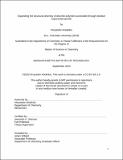Expanding the structural diversity of discrete polymers accessible through iterative exponential growth
Author(s)
Khokhlov, Khrystofor
DownloadThesis PDF (1.187Mb)
Advisor
Johnson, Jeremiah A.
Terms of use
Metadata
Show full item recordAbstract
Iterative exponential growth is a powerful method for the synthesis of atomically defined macromolecules. However, preparation of enantiopure IEG-ready monomers can be challenging, which may limit the attractiveness of IEG as a tool for the study of structurerelationship properties in discrete macromolecules, both in materials and in biological systems. Here, we present a new strategy for the synthesis of orthogonally protected monomers, suitable for IEG through cycles of azidation, alkyne deprotection, and CuAAC, in fewer steps and from readily available and affordable building blocks. This monomer synthesis was achieved through the development of a novel allylation methodology. Using alkynylation of epichlorohydrin, LiBr Finkelstein, and TfOH-promoted allylation, we have been able to prepare a monomer for 3A (number of carbons in each polymer repeat unit, excluding alkyne) IEG in just three steps. Furthermore, the same reactions can be integrated in the synthesis of other IEG architectures (2A/4A/5A), thus expanding the structural diversity and readily accessible substrate scope for atomically defined macromolecules. The configurations of stereogenic centers in IEG-mer backbones are defined by the starting material (R or S epichlorohydrin) and can be further controlled by combining different stereoisomers in desired fashion. This work outlines a conceptual strategy to diversify and expand the chemical space of discrete macromolecules and enable efficient and quick access to a variety of IEG-mer scaffolds.
Date issued
2023-09Department
Massachusetts Institute of Technology. Department of ChemistryPublisher
Massachusetts Institute of Technology